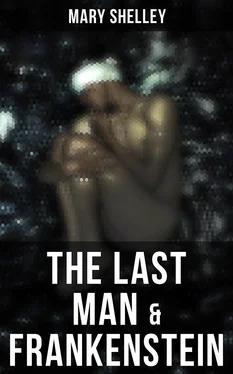I returned home, not disappointed, for I had long considered those authors useless whom the professor had so strongly reprobated; but I did not feel much inclined to study the books which I procured at his recommendation. M. Krempe was a little squat man, with a gruff voice and repulsive countenance; the teacher, therefore, did not prepossess me in favour of his doctrine. Besides, I had a contempt for the uses of modern natural philosophy. It was very different, when the masters of the science sought immortality and power; such views, although futile, were grand: but now the scene was changed. The ambition of the inquirer seemed to limit itself to the annihilation of those visions on which my interest in science was chiefly founded. I was required to exchange chimeras of boundless grandeur for realities of little worth.
Such were my reflections during the first two or three days spent almost in solitude. But as the ensuing week commenced, I thought of the information which M. Krempe had given me concerning the lectures. And although I could not consent to go and hear that little conceited fellow deliver sentences out of a pulpit, I recollected what he had said of M. Waldman, whom I had never seen, as he had hitherto been out of town.
Partly from curiosity, and partly from idleness, I went into the lecturing room, which M. Waldman entered shortly after. This professor was very unlike his colleague. He appeared about fifty years of age, but with an aspect expressive of the greatest benevolence; a few gray hairs covered his temples, but those at the back of his head were nearly black. His person was short, but remarkably erect; and his voice the sweetest I had ever heard. He began his lecture by a recapitulation of the history of chemistry and the various improvements made by different men of learning, pronouncing with fervour the names of the most distinguished discoverers. He then took a cursory view of the present state of the science, and explained many of its elementary terms. After having made a few preparatory experiments, he concluded with a panegyric upon modern chemistry, the terms of which I shall never forget: –
“The ancient teachers of this science,” said he, “promised impossibilities, and performed nothing. The modern masters promise very little; they know that metals cannot be transmuted, and that the elixir of life is a chimera. But these philosophers, whose hands seem only made to dabble in dirt, and their eyes to pour over the microscope or crucible, have indeed performed miracles. They penetrate into the recesses of nature, and shew how she works in her hiding places. They ascend into the heavenes; they have discovered how the blood circulates, and the nature of the air we breathe. They have acquired new and almost unlimited powers; they can command the thunders of heaven, mimic the earthquake, and even mock the invisible world with its own shadows.”
I departed highly pleased with the professor and his lecture, and paid him a visit the same evening. His manners in private were even more mild and attractive than in public; for there was a certain dignity in his mien during his lecture, which in his own house was replaced by the greatest affability and kindness. He heard with attention my little narration concerning my studies, and smiled at the names of Cornelius Agrippa, and Paracelsus, but without the contempt that M. Krempe had exhibited. He said, that “these were men to whose indefatigable zeal modern philosophers were indebted for most of the foundations of their knowledge. They had left to us, as an easier task, to give new names, and arrange in connected classifications, the facts which they in a great degree had been the instruments of bringing to light. The labours of men of genius, however erroneously directed, scarcely ever fail in ultimately turning to the solid advantage of mankind.” I listened to his statement, which was delivered without any presumption or affectation; and then added, that his lecture had removed my prejudices against modern chemists; and I, at the same time, requested his advice concerning the books I ought to procure.
“I am happy,” said M. Waldman, “to have gained a disciple; and if your application equals your ability, I have no doubt of your success. Chemistry is that branch of natural philosophy in which the greatest improvements have been and may be made; it is on that account that I have made it my peculiar study; but at the same time I have not neglected the other branches of science. A man would make but a very sorry chemist, if he attended to that department of human knowledge alone. If your wish is to become really a man of science, and not merely a petty experimentalist, I should advise you to apply to every branch of natural philosophy, including mathematics.”
He then took me into his laboratory, and explained to me the uses of his various machines; instructing me as to what I ought to procure, and promising me the use of his own, when I should have advanced far enough in the science not to derange their mechanism. He also gave me the list of books which I had requested; and I took my leave.
Thus ended a day memorable to me; it decided my future destiny.
Table of Contents
From this day natural philosophy, and particularly chemistry, in the most comprehensive sense of the term, became nearly my sole occupation. I read with ardour those works, so full of genius and discrimination, which modern inquirers have written on these subjects. I attended the lectures, and cultivated the acquaintance, of the men of science of the university; and I found even in M. Krempe a great deal of sound sense and real information, combined, it is true, with a repulsive physiognomy and manners, but not on that account the less valuable. In M. Waldman I found a true friend. His gentleness was never tinged by dogmatism; and his instructions were given with an air of frankness and good nature, that banished every idea of pedantry. It was, perhaps, the amiable character of this man that inclined me more to that branch of natural philosophy which he professed, than an intrinsic love for the science itself. But this state of mind had place only in the first steps towards knowledge: the more fully I entered into the science, the more exclusively I pursued it for its own sake. That application, which at first had been a matter of duty and resolution, now became so ardent and eager, that the stars often disappeared in the light of morning whilst I was yet engaged in my laboratory.
As I applied so closely, it may be easily conceived that I improved rapidly. My ardour was indeed the astonishment of the students; and my proficiency, that of the masters. Professor Krempe often asked me, with a sly smile, how Cornelius Agrippa went on? whilst M. Waldman expressed the most heartfelt exultation in my progress. Two years passed in this manner, during which I paid no visit to Geneva, but was engaged, heart and soul, in the pursuit of some discoveries, which I hoped to make. None but those who have experienced them can conceive of the enticements of science. In other studies you go as far as others have gone before you, and there is nothing more to know; but in a scientific pursuit there is continual food for discovery and wonder. A mind of moderate capacity, which closely pursues one study, must infallibly arrive at great proficiency in that study; and I, who continually sought the attainment of one object of pursuit, and was solely wrapt up in this, improved so rapidly, that, at the end of two years, I made some discoveries in the improvement of some chemical instruments, which procured me great esteem and admiration at the university. When I had arrived at this point, and had become as well acquainted, with the theory and practice of natural philosophy as depended on the lessons of any of the professors at Ingolstadt, my residence there being no longer conducive to my improvements, I thought of returning to my friends and my native town, when an incident happened that protracted my stay.
Читать дальше












